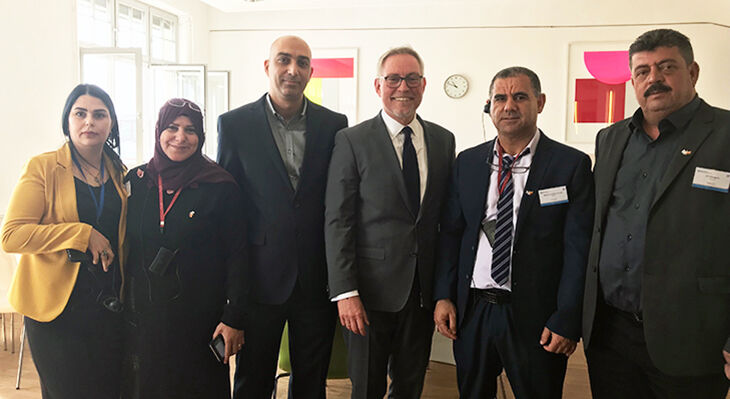More skilled labour needed: VET in Israel
In the anniversary year of the Israel Programme, Israeli vocational education and training experts travelled to Germany in May. They wanted to learn how vocational education and training can reverse the skilled labour shortage. In the Central Franconia region, they familiarised themselves with the mechanisms of vocational education and training in Germany.

It is not easy to attract young people to vocational education and training. However, Israel needs well-trained, non-academic skilled labour. The country has repeatedly postponed systemic reforms to vocational education and training. It is now making a new push in this area.
The aim of the study trip was to become acquainted with the dual system of vocational education and training in Germany. The delegation had chosen to visit Central Franconia – a metropolitan region containing the cities of Erlangen, Fürth and Nuremberg. Their first stop was the Ludwig-Erhard School in Fürth, which explained the school-based part of the training – the vocational schools.
The school administration there provided the opportunity for e-commerce merchants and retail salespeople to sit in on a school lesson. The delegation divided itself into two groups for this. The Arab participants were able to talk directly about the training to trainees who speak their mother tongue. The technical school in Erlangen provided an insight into modern mechatronics and electronics training.
A further highlight of the day was visiting the state-of-the-art technical training centre of SIEMENS AG. On the two subsequent days, the Handwerkskammer Mittefranken (Central Franconian Chamber of Crafts and Trades) organised a specialist programme to provide a 360-degree view of the mechanisms of handicraft training (vocational orientation, master craftsman training, innovation, pedagogical concepts). Visiting the education and training centre, participants again had the opportunity to talk directly to trainees who speak their mother tongue and to the associated trainers. Prospective plant mechanics who had fled from Syria reported on their training in Germany, comparing it with the opportunities available in their home country. The delegation then went to the innovative Fürth-based company Silbury Deutschland GmbH, whose management proudly presented their training in the area of information technology. The Israeli guests were impressed by the projects conducted by trainees. These included a project on the use of artificial intelligence to manage the employee’s vacation. The project is being implemented together with Indian partners, who are connected via Skype. In the Chamber of Crafts and Trades, the guests gained an insight into the future of the dental technician trade. At the Euro-Bildungswerk training institute, they learned how refugees and retrainees are trained. At the KfZ-Innung Nürnberg (Nuremberg vehicle guild), the topic was master craftsman training in the age of 4.0. Alongside a vibrant ecosystem of small and medium-sized companies, the Franconia region also accommodates several global corporations – including Scheffler, SIEMENS, MAN, adidas, PUMA, UVEX and Diehl). In the Chamber of Industry and Commerce for Middle Franconia, the chamber acted as an examination coordination centre. A leading company in the area of building automation is Neuberger GmbH in Rothenburg ob der Tauber. The stimulating trip to Germany was rounded off by a visit to the firm’s training section, where participants had many questions.
In a closing discussion, the 20 participants explored the possibilities for transferring what they had learnt to the Israeli context, but saw a need for further consultation on implementation.
The German Office for International Cooperation in Vocational Education and Training (GOVET) at BIBB organised the trip on behalf of the German Federal Ministry of Education and Research (BMBF). The German-Israeli Programme for Cooperation in Vocational Education and Training (Israel Programme) is a bilateral cooperation and funding programme between the Israeli Ministry of Economics and BMBF. Part of the Programme for Cooperation in Vocational Education and Training involves promoting educational visits to the partner country for teaching staff, researchers and trainees